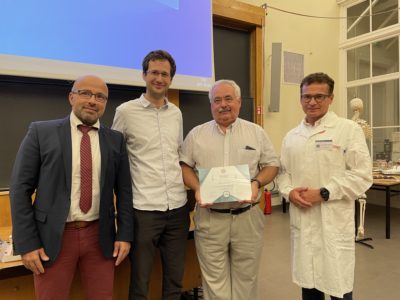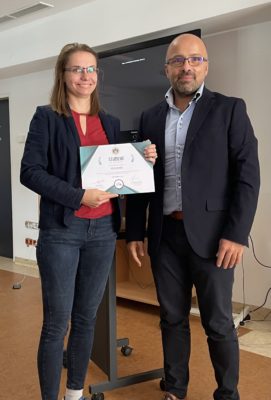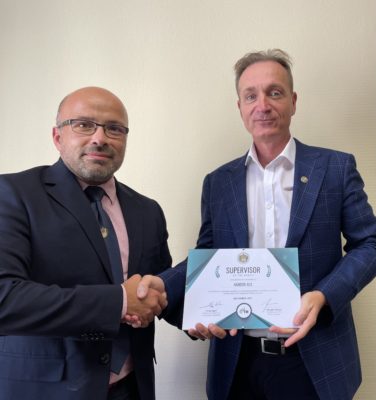The Centre for Translational Medicine plans to give monthly prizes to the group of the month, junior investigator of the month and supervisor of the month. Although September was only first month of the TM PhD program, it was no exception.
The Dentistry Group was named the ”Group of the Month” in the Centre for Translational Medicine’s Ph.D programme in September. We interviewed Dr. Gábor Gerber, who, in addition to being the Dean of the Faculty of Dentistry, is also a supervisor in the TM programme.
What motivated you to participate in the TM programme?
I had a small advantage, Professor Gábor Varga was already involved in the Translational Medicine programme in Pécs and invited me to participate. I got involved in the meta-analysis studies and I had the opportunity to get acquainted with the programme. This ensured me that it can be fruitful for our Faculty as well. As a dean, I consider that it is very important for our faculty to be scientifically active and successful. I was able to encourage our colleagues based on my already existing personal experience. Professor Péter Hermann was also convinced that participation in the program is important not only for the success of the participating individuals, but also for the Faculty of Dentistry, and it is beneficial for both young researchers and their supervisors. Ina summary, based on my previous experience and in the interests of the progress of the Faculty, it was clear that we needed to aim the maximum use of the new PhD places, which was made possible by the Rector of the university.

Nearly two months have passed, what do you think of the program? Is it what you have expected?
The weekly group meetings are attended by all 11 students and their mentors in our group. I participate there also as a mentor myself. It was a positive surprise the high level of the programme in which we are involved, and how accurately it is planned and operated. Although I knew the TMC team was effective, it surprised me, my mentor colleagues, and the students that how practical are the regular progress reports and follow-ups of this educational programme. Together with Professor Hermann, we experienced that students learn quickly how to ask scientifically sound questions and how to answer them. We can see a high-level of commitment of the participants. It is very important that the directors of the clinics and institutes are also very supportive. Students and mentors from several clinics and institutes pay attention to each other’s presentations, think together and have the opportunity to establish collaborations.
I would say that we get more than we expected. The structure of the system is excellent, as more experienced colleagues help the young investigators. Professor Hegyi’s active regular participation in these group meetings is a great example of devoting time and energy, which is highly motivating for all of us. For university leaders, such as Vice-Rector, Péter Hermann professor or myself as a Dean the participation as mentors also represent a great challenge. But we are convinced that we can expect substantial results from this programme.
Were you surprised when your working group was selected in September?
I was not aware of this monthly internal competition, so I was surprised that we received this award, although Professor Péter Hegyi had already expressed to the team that he was pleased with the progress. I consider the award a nice motivation. I am also proud of it because it is important for the Faculty. Maybe more departments can be involved later, as it can be motivating for them too.
What do you think the reason was for selecting your group?
I think it is important that the Faculty leadership and the directors of our clinics and institutes and the mentors take the programme seriously. It was good that it was communicated at the recruitment stage that time commitment of participants are absolutely needed. Those who applied were aware of the time and energy investment required, the persisted on keeping this. The challenges were stimulating, so Ph.D students and mentors actively participated in the group meetings. I believe that this effort and work has been rewarded by the Centre. The leaders and supervisors set a good example and the students take the tasks seriously as well. If you work hard for something, its value is higher. It also brings the group together.
Do you think the group can maintain this level of work effectivity?
Yes, I think the group can maintain this pace and quality. The manuscripts, the projects are getting to a level that can be a further confirmation. The comments and criticisms received are stimulating. This project requires a big investment from everybody, but the enthusiasm is there and seeing how the others progress is also motivating.
How would you describe the student-supervisor cooperation in your group? What do you consider the most important?
I see all the tutors at the group meetings. They actively work with the PhD students. They attend regularly, they see the progress. The mentors also learn the methodologies. Many times the students know the details better and the supervisors provide conceptual support. Students feel the continuous support by their mentors. They receive professional help in clarifying questions and evaluating articles.
The programme is surprisingly well planned and detailed. The first time was very impressive. I am glad that Professor Gábor Varga coordinates this programme at our Faculty. He underlined the importance of the programme for potential tutors, then Professor Péter Hegyi visited the Faculty of Dentistry and then its institutes in the Spring to present the programme and encourage participation.
I am delighted that the programme has started very successfully. We also look forward to the continuation of the program, to introduce us the professional planning and building patient registries and randomized clinical trials as well.
Adrienn Kéri from the pediatrics group got the junior investigator of September prize. Below you can read our short interview with her.

What motivated you to enter the SE TM program?
I was always interested in the science and research, despite I have chosen clinical practice when I earned my medical degree. I believe that patients benefit from evidence based medicine.To me it means we should integrate science into clinical practice. I hope that this PhD programme gives me the possibility to learn how to narrow the gap between scientific research and clinical practice.
After a month, what do you think about the SE TM program, this is what you have expected?
Although the time elapsed is very short, I still feel that the training fully meets my expectations. I have found practice oriented education that aims to bring science back to clinical practice.
Please share your secrets with us; how did you win this prize?
I do not really have a secret. I suppose I won the prize because I am enthusiastic and very interested in my research topic and I can rely heavily on working with my excellent supervisor.
Do you think that your approach to your projects would work for everyone?
I believe that personal devotion to the research topic, either because a life experience or just long-lasting interest could double the effectiveness of hard work.
How do you plan your performance for the next months?
I would like to continue my work using more and more information and experience gained during the training.
What are your experiences regarding lectures and group meetings?
Every lecture, practical course and group meeting take place in a supportive and joyful atmosphere. Even if we cannot learn everything what is needed during the lectures and practical courses instantly, there is always someone with whom we can contact later.
Based on your experiences so far, would you recommend this program to those considering participating in a doctorate course?
I would strongly recommend this programme for those who are in clinical practice and considering the participation in a PhD programme.
The deserved supervisor of the month title was awarded to Nándor Ács, and the interview with him can be read below.

What motivated you to enter the SE TM program?
For me the programme seemed to be really promising from the very beginning. The well organised team and the expertise of the TM colleagues has hit an unmet need at our Department. I believed that our clinical experience and the immense volume of patient data plus the TM organisation knowledge could lead to significant scientific output.
After a month, what do you think about the SE TM program, this is what you have expected?
Yes, without any doubt. Things simply go as they had been expected by us.
What do you think was the reason for you being chosen as supervisor of the month?
Maybe my commitment to the programme seemed to be strong enough. I am really convinced that our joint venture is „the beginning of a beautiful friendship”.
How can a supervisor assist their PhD students effectively?
We have to give dedicated time for consulting our students. Since they are probably less experienced, we have to provide a strong clinical background to answer their questions.
Presumably, would you support those colleagues of yours at the Clinic in the future who would like to participate in TM Programme as a PhD student?
Certainly yes. The programme seems to work really effectively.
What do you think, what is the most important characteristic of the group leaders, to achieve such good results?
As I mentioned before, the leaders must be committed to this scientific programme. We have to inspire our students if they seem to be uncertain or moderately diligent at certain times.
We would like to congratulate you all!